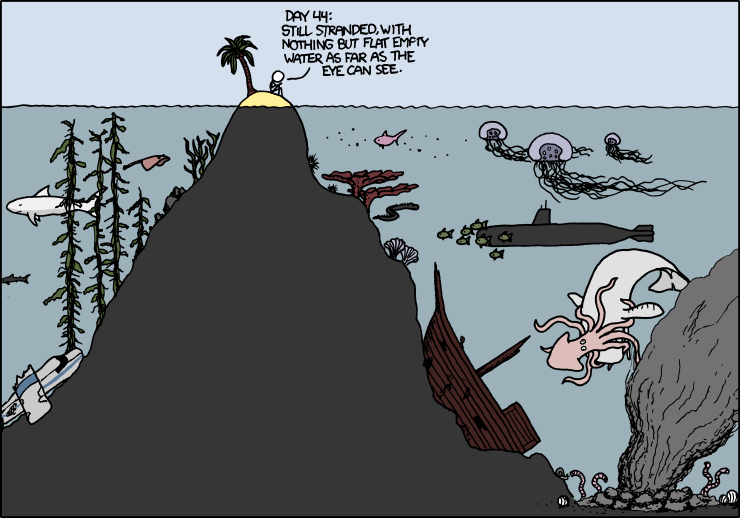
ARRRRR ME HEARTIES!!!! So ye want t’ be a pirate, t’ sail the open sea searching for booty – what? You said a marine biologist? Oh. Well, sailing the open sea searching for booty is actually prohibited by UNOLS regulations – what? Oh, you wanted advice on how to BECOME a marine biologist. All right then. Fall must be the time when a
student’s heart turns toward the call of the sea, for I have received several requests for advice from undergraduate students.
And let me just get this out of the way – being a marine biologist is not about pulling golf balls out of whale blowholes or hugging dolphins. If you want to do that, become a wildlife veterinarian or a dolphin trainer. Marine biology is about figuring out the way the ocean works – and most of the ocean is not made out of dolphins. (That is too horrible a scenario to contemplate).

There are bad reasons and good reasons to become a marine biologist. Fortunately Dr. Milton Love has a convenient list which you should go read immediately. Go there now. Still want to be a marine biologist? Did you read the part about the smell? Ok, you’re sure? Keep on reading this blog post, then.
The following advice is aimed at undergraduates, and is my personal opinion and should by no means be taken as the One True Way. I invite our marine biological readers (both academic and non-academic) to add their own suggestions in the comments.
GET YOUR ACADEMIC SCIENCE ON
You have to have a solid, traditional science background to be a marine biologist. This means the standard coursework in biology, chemistry, physics, math, and statistics. If you want to take environmental studies-interdisciplinary-type courses, go ahead, but it won’t do you any good without the basics. The easiest way to do this is to major in a hard science, but it is possible to major in something else so long as you do this coursework. You don’t have to love all of it – please don’t ask me about my grade in Organic Chemistry – but you have to do most of it reasonably well. I strongly recommend computer programming as well – scientists today live in a glorious sea of data, and you are going to have to know how to program in order to avoid drowning in it. (I spent a year and a half weeping into my R code – don’t be like me!).
Assuming you want to be a marine BIOLOGIST, take lots of biology! Ecology, evolutionary biology, genetics, microbiology, cell biology, invertebrate zoology…even if the course is not directly about marine science, you will be learning skills that can answer questions about the ocean. If you don’t like advanced biology courses, well, you probably won’t like marine biology.
FIND A WAY TO GET RESEARCH EXPERIENCE
So, marine biology is about learning how the amazing animals and ecosystems of the ocean work, but how exactly do we do that? RESEARCH! Classwork will give you the basics, but working in a lab or doing independent research is how you’re going to learn how science is actually done. It is easiest to start as an undergraduate, since there are lots of opportunities and resources out there to help you. (More on non-undergraduate opportunities later).
You might notice that many of the things on this list involve talking to your professors. Getting to know them is one of the best investments you can make, though I know it’s not easy, especially at large universities. But science professors (along with teaching) are also running a lab, doing research, talking with other scientists who are doing research, and have graduate students in need of help with their own research – so getting to know them is one of the best ways of getting your foot in the door. Also, you’re going to need recommendation letters for most of the below list of programs, and it’s pretty hard for a professor to write a letter for a student they’ve never spoken to. So go to office hours and talk to them – the best time is at the beginning of the semester when things are pretty quiet.
Here’s a list to get you started:
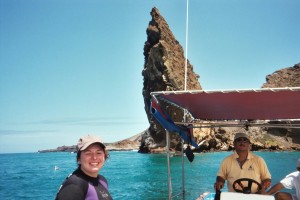
- Work in a lab. I got started in marine ecology when some weird guy I knew from student theater said that his lab was hiring undergrad assistants. I needed a job, and that sounded fun. Well, scanning several thousand slides (this was before digital cameras) was not exactly fun per se…but it got me involved in the life of the lab. I met the graduate students, went to lab meeting, and started to learn how this whole science thing worked. Many labs hire undergraduate research assistants, and it is a great way to learn about science while gaining some useful skills. So go to your professors’ office hours and ask if there are any opportunities in their labs, or if they know of any in their departments.
- Take a research semester abroad. There are many programs that allow you to go abroad, get course credit, and do science. They may cost more money than your usual tuition, but may also have financial aid programs. The two programs I know of off the top of my head are Sea Education Association (sail on a tall ship, learn oceanography and maritime skills) and Three Seas Program (coastal marine science in New England, the Caribbean, and southern California). Both of these program have a strong academic component (e.g., you’ll do coursework in marine science) and emphasize independent research skills. No doubt there are more of these programs – if you have experience with one, please add it in the comments. [Update: Another program mentioned in the comments: the Williams College/Mystic Seaport Maritime Studies Program.] [Update II: Also CSU Marine Biology Semester at USC Wrigley Institute for Environmental Studies].
- Do independent research. The core of being a marine biologist is, of course, research. One of the best ways to get research experience is through the National Science Foundation Research Experience for Undergraduates (REU) program. These are usually summer programs (though some are at different times of year) that set you up with a lab and and a mentor, and pay you a reasonable stipend (enough to satisfy most work-study requirements) to do research. You can search on their website for programs you might be interested in – here is the list of Ocean Sciences REUs. (I did two REUs as an undergraduate and they were both amazing experiences.) Another great resource is Pathways to Science, which focuses particularly on connecting underrepresented groups with mentors and opportunities. Your university may also have programs just for its own students – investigate by asking your professors and with the appropriate Student Affairs office. [Update: the MBARI Summer Internship.]
YOU’VE GRADUATED – NOW WHAT?
Once you are no longer a student, the path becomes more twisty and difficult, and some of the unfairness of the academic system kicks in. Here are your options:
- Go directly to graduate school, do not pass go, and definitely do not collect $200. If you’ve majored in a hard science and gotten some independent research experience, you have the option of going directly to graduate school. (How to do that is a topic for another post.) While many excellent scientists have gone straight through, my personal recommendation is to take a year or three and getting some work experience. Enjoy not having homework and going out with your friends during the week. Being a bit older and more mature will help your sanity later on.
- Get a job in academic science. Many labs have research assistants – people who are paid to help in the field or in the lab. These jobs can be an amazing way to get experience, to meet people in your field, and to go awesome places. Unfortunately, they are usually funded off grants, which makes them ephemeral and badly paid. Some only pay room and board, particularly those in exotic locations. If you don’t have student loans and can stay on your parents’ health insurance (and you are a traditional student in your early 20s) – these can be a great option for grand science adventures. If you have student loans and/or are not on your parents’ health insurance and/or cannot just pick up and go to crazy locations, these may be very difficult for you to do. The best resource for finding these type of jobs that I know of is the ECOLOG-L listserv. Other paid options that people I know have done include working as fisheries observers or as educators at aquariums.

- Get a job that is not in academic science, but will give you useful experience anyway. When I graduated from college, I had to take a job that would not only pay me, but give me health insurance. While I found it frustrating at the time, it actually led to unexpected paths that have proved very valuable – for example, the construction job that taught me about managing a large project (and about rebar! I love rebar!). When I was interviewing for graduate school, my construction job made me stand out from the crowd. Just be prepared to explain how your nonstandard experiences will help you be successful in marine biology. However, this works best if you also have a strong science background from undergrad.
- Get a nonscience job and volunteer with scientists. Many labs and research expeditions take volunteers along. If you have a regular job but want to get into science, volunteering can be a great way to get your foot in the door. This works best if you have some time available during regular work hours, but some people take volunteers at night or on the weekends. If you have a really flexible schedule, it is possible to volunteer to work on an oceanographic vessel for the duration of a cruise (which can be anywhere from a few days to several weeks). The best way to find volunteer positions is to email people who you might be interested in working with – even if they are not accepting volunteers, they may know someone who is.
IN SUMMARY
To paraphrase Michael Pollan: “Basic science. Lots and lots. Mostly research.”
MORE RESOURCES
- Dr M’s excellent post So You Want to Be A Deep-Sea Biologist. [edit: added this link 13 Nov 21:00 PST]
- Danna Staaf on How to Become a Cephalopodiatrist. She focuses on cephalopods, but most of her advice holds true for all fields of marine biology. [link added 15 Nov 0800 PST]
- The indispensable Dr. Milton Love’s So You Want To Be A Marine Biologist and So You Want To Be A Marine Biologist: The Revenge
- Becoming A Marine Biologist from SUNY Stonybrook – also in Chinese! (PDF)
- Advice from former Scripps graduate student Greg Szulgit.
- Huge list of resources from Hopkins Marine Lab
- Christie Wilcox (now of Science Sushi) tells her story


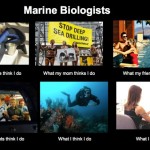

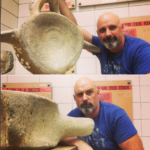
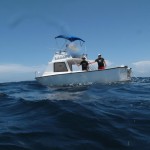
Excellent summary. I’ll reiterate your point about computer programming- I’m struggling through an R-based stats course at the moment. Also, GIS can be very useful depending on what subdiscipline you’re planning on working in.
Great piece. Even though I’m a marine geologist, you have no idea how many times I’ve had to explain that “no, marine biologists don’t snuggle with dolphins” in the past year alone.
Seconding SEA….but I’m biased as I’m an alumnus.
I’ll third the point about programming. If you plan on working with datasets that won’t fit on a single screen’s worth of spreadsheet, programming will likely be in your future. And just FYI, these datasets are also known as “the ones that let you reach statistically-significant conclusions.” Take your school’s intro CS class, which is hopefully fun and will teach you how to do things like write your own Tetris or Breakout game, while simultaneously instilling good programming fundamentals.
Programming is increasingly important in all kinds of different scientific fields, and for good reason–it allows you to do much more sophisticated, creative, powerful analyses more rigorously and repeatably than you can using off-the-shelf software. If you don’t believe me, pick a few of your favorite marine biologists and ecologists and ask them how much time a week they spend programming, versus doing calculus or O-chem.
An informative ‘blog-spot’ well done….love it !
Another great (though less intensely science-focused) undergrad semester: The Williams College/Mystic Seaport Maritime Studies Program. 20 students, 1 semester, led by tirelessly energetic, chocolate-fueled, invasive species guru Dr. James T. Carlton. Live at the Seaport museum, and take field seminars in the Pacific, the Gulf coast, and aboard a tall ship in the Atlantic.
And don’t forget–if the science-ness of it all gets you down, there’s always the humanitarian angle of Marine Policy! The oceans need laws and regulations, too…
Great article! After just spending a week aboard an oceanographic research vessel in the Mediterranean Sea, I definitely have even more respect for you and other scientists working to understand our oceans and our whole planet. The ship was E/V Nautilus, out of the University of Rhode Island. There were some graduate students aboard, most from URI, but some from a Univ in Israel. Fascinating work being done. I can only imagine the amount of time it will take to record and study the samples being brought home.
I will guess that in the photo, you are down near Cabo San Lucas? I hope I get a cookie!
Completely agree except that R could not be considered programming…
The proper learning of matlab environment is soooooooo important these days.
Next time you’re at Scripps, stop by! I’d love to hear about your science adventures! Unfortunately, no cookie this round, but here’s a hint.
Not to start a programming language flame war here…but R has major advantages over Matlab when it comes to statistical programming and analysis, and is increasingly widely used in a variety of fields, from ecology to epidemiology to finance. Matlab has many users in many fields, especially in engineering and related disciplines. Matlab has elegant syntax for matrix and array operations, plus some powerful toolboxes, but it has some serious shortcomings as a programming language. This is not to mention the fact that it is expensive and closed-source. I used Matlab for about a year at the end of my undergrad degree, but switched over to R and SciPy when I started my master’s, and haven’t looked back.
This is like the best use of the internet ever. It’s becoming easier and easier to answer those e-mails with a list of great links!
I recently wrote a post on How to Become A Cephalopodiatrist which is mostly about grad school (but not actually all that specific to cephalopods).
Yes, pretty much my purpose in doing this post is so I can avoid writing out the same email again and again.
Thanks for the link! I read it at the time and had completely forgotten – my apologies. I have added it to the list of resources above.
ahhh, the Galapagos…
cookie??
And for aspiring undergrads and grads.. I recommend (but am biased) the summer internship program at the Monterey Bay Aquarium Research Institute.
http://www.mbari.org/education/internship/genintern.htm
Definitely Galapagos – Pinnacle Rock at Bartolome Island.
Cookie for you! And thanks to the link to the MBARI program – I’ll add it above.
You get two cookies for nailing the exact location!
Jim Carlton is AWESOME – it would be amazing to take a field class with him. I <3 <3 <3 the latest edition Light and Smith Manual.
I'll add the link to the Williams/Mystic program above. I'm pretty sure they get to sail on the SEA tall ship SSV Cramer too.
BTW – one thing I’d like to mention is that there are ways to contribute to Marine Biology without actually being a professional Marine Biologist. I’m a software engineer but I play marine biologist on the weekends and spend a lot of time underwater taking pictures and just observing. It’s amazing what amateurs can see and discover if they pay attention. And I’ve found that real scientists love to hear from amateurs (Hi Milton!) and that the interactions can be mutually beneficial.
I think this needs to be the next post in the series! “So you wanna be a marine biologist, without being a marine biologist?” There are so many opportunities for computer engineers, marketers, etc. to make a huge splash in the field
Great post Miriam-
Currently partaking at the CSU Marine Biology Semester at USC Wrigley Institute for Environmental Studies on Catalina. Great opportunity for any students in the CSU system. Outstanding faculty and independent study program. Would recommend to anybody looking for a research semester.
Thanks A-pain! Added it above. Glad you’re having fun out there!
Love to see my photo used here, Miriam. It was taken at Sea Life Park Hawaii (where I studied Marine Science). Fully agree with everything. Only one difference: during field classes off North Shore Oahu we often were accompanied by Spinner Dolphins and passed by dozing Humpback whales… :-). Unfortunately dreamy ideas like “following humpback whales with a sailing boat” and “studying dolphin intelligence” indeed were wide spread among undergraduates. Well – and my daughter (7) wants to be a Marine Scientist. She dreams of riding on an Orca. Sigh. Let’s say her interest in, say, copepods is somewhat limited.
Stefan, that is the most hilarious origin story I can imagine for that photo! I’m so glad you don’t mind my little alteration – the Wikipedia license said that it was ok, but you never know. I must admit that marine mammals have their place (I am especially fond of Dall’s porpoises), but the people who actually study them spend a lot of time at their computer and no time at all doing any hugging. I’m sure your daughter will appreciate the glory of copepods in time – try this sappharinid when she’s ready. :)
Stefan, have you tried giving your daughter one of these, then? http://www.giantmicrobes.com/us/products/copepod.html
@Miriam: I like my pictures to be used – the license is on purpose. So far all my pictures were used in a context I can support – always interesting.
I will give Sophie some time to discover the glory of copepods… She is deeply in love with all things Orca, but she already appreciates the concepts of trophic levels. That’s where the wisdom begins… (and her name is Sophie Maris – i.e. “wisdom of the sea) ;-).
About the career – you are right. My academic background is in astronomy/physics on the one and geography/marine science on the other hand. But while I studied 80s to 80s) these rather hands-on subjects transformed to “Geo Information Sciences” and something that I would call “Astroinformatics”. And we all were transformed to computer geeks.
@Aeolius: thanks for the cuddly copepod! Crazy. I’ll consider it. My girls collect marine critters (as stuffed toys, I mean), but the smallest one we have so far is a shrimp.
thx for the facts!! love it
Would you be willing to let a high school student (who is interested in marine biology) interview you? She is a student in my English class and is working on a research report, which must include an interview component, about becoming a marine biologist.
Certainly, she can interview one of the Deep Sea News crew. Have her contact us here: https://www.deepseanews.com/about-2/contact/
I just wanted to thank you for writing this. c: I’m only in high school but I’m really interested in marine biology and this article helps me understand a lot more about what being a marine biologist actually means. Now I know it’s never too early to start… I will definitely check out the programs and steps you talked about, and in my spare time, I’ll try to look through this website! <3
i’m studying marine biology here in indonesia, and this article really help me much to get my homework done.
This is funny. Mostly because I really wanted to become a Marine Biologist (and because I love dolphins) but instead went into the landlocked major Landscape Architecture. Now into my 40’s I tried to get back into an ecology major and was told that I couldn’t attend grad school without a grant or funding. Here I just thought I could pay tuition. For all those aspiring Marine Biologists…pursue your dream while you still have the chance! I can only wish right now. Sincerely, landlocked in Bozeman, Montana.
I am 47, keep saltwater aquariums, run an undersea D&D Game, have sea critter tattoos, am SCUBA certified, and sometimes swim as a merman. Would I take an online marine biology course? Absolutely!
While people are pushing their favorite undergrad marine biology programs, I will mention mine. The Semester by the Sea program at U Maine’s Darling Marine Center offers a full semester load of courses during the fall semester. Nothing like a full semester on the Maine coast, unless of course you can’t bear to pull yourself away from the tropics. But for a number of years I co-taught the invertebrate zoology course at the DMC. It was a blast. We had the whole day Wednesday for our course, so we could go in the field, have labs and lectures on any schedule we wanted. Sometimes the lectures were on the beach after a morning of digging in the sand. The courses are still run that way…
Thank you so much. This was very useful, especially all the links!
This is a fantastic post! As a marine biology major, it really confirms that I’m on track and doing the right things, and the advice for after school seriously made me rethink my plans.
I am from Bangladesh, which is a very poor and also developing country. I have completed my B. Sc Degree with Honors on Marine Science from a University with a very good result.
On the perspective of Bangladesh now I am feeling the necessities of getting Masters on Marine Biology from a good university as well as from abroad. So that I can be a foreign literate highly qualified marine Scientist having well versed in the subject to participate in the socio economic development of my country. As I am from an aristocrat family my parents addressed this decision warmly.
I am very much interested about Indonesia. So I want to complete my higher degree from there if possible. As an international student I need some information from you or any of theme that how can I get admit on M.Sc. Furthermore is there any chance for me to work with you for practical knowledge or more any program?
Well i’m only a 12 year old boy but i want to be a marine biologist when grow up and I want to work in the Atlantic Ocean. What are some things that I can do now to become a marine biologist in the future?
thanks for this article. It really helped me decide what to do with my life!!!!!
Hi, I’m in high school and soon I’m going to have to start deciding on what I want to do with the rest of my life, I love fishing and I’m fascinated by the ocean and marine biology seems like an awesome major but I want to make money. This makes me wonder, How can I be a marine biologist without actually becoming a marine biologist?
Hi, my name is Veronica and I’m in 10th grade. I’m doing a research project on a future career that i would like to pursue and how chemisty is used in that career. If you could give me some comments that would be very helpful :)
Would getting as much SCUBA experience and getting a PADI Marine Research certification be a good idea?
I really enjoyed reading this! I found it to be an informative article that wasn’t without humor.
When I was about four or five, my family got a membership to the local aquarium. We went there every Friday for as many years as I can remember. We stopped for a year or so,though. But, my interest in the ocean was rekindled when I started going to the beach more often, and have been revisiting the aquarium recently.